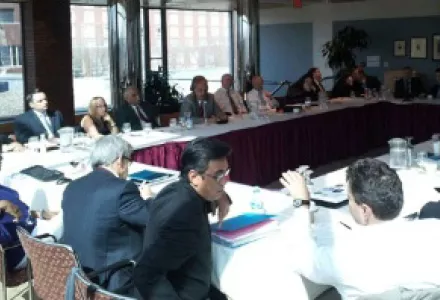A Conversation with Bonnie Jenkins and Thomas Countryman
A conversation with Thomas Countryman, Assistant Secretary of State for International Security and Nonproliferation, and Amb. Bonnie Jenkins, Coordinator for Threat Reduction Programs.
A conversation with Thomas Countryman, Assistant Secretary of State for International Security and Nonproliferation, and Amb. Bonnie Jenkins, Coordinator for Threat Reduction Programs.

A conversation with Thomas Countryman, Assistant Secretary of State for International Security and Nonproliferation, and Amb. Bonnie Jenkins, Coordinator for Threat Reduction Programs.
Thomas Countryman, a career member of the Senior Foreign Service, rank of Minister-Counselor, is currently serving as the Assistant Secretary for International Security and Nonproliferation. The ISN Bureau leads the U.S. effort to prevent the spread of nuclear, chemical, and biological weapons, their related materials, and their delivery systems.
Ambassador Jenkins currently serves as the State Department’s Coordinator for Threat Reduction Programs in the Bureau of International Security and Nonproliferation. She is the State Department lead on the Nuclear Security Summit, and she coordinates State Department activities related to the 4-year effort to secure all vulnerable nuclear material. She is also the U.S. Representative to the G8 Global Partnership Against the Spread of Weapons and Materials of Mass Destruction. Ambassador Jenkins coordinates Department of State Cooperative Threat Reduction (CTR) programs as well as a number of interagency CTR programs to help ensure a coordinated U.S. approach when promoting these programs internationally.